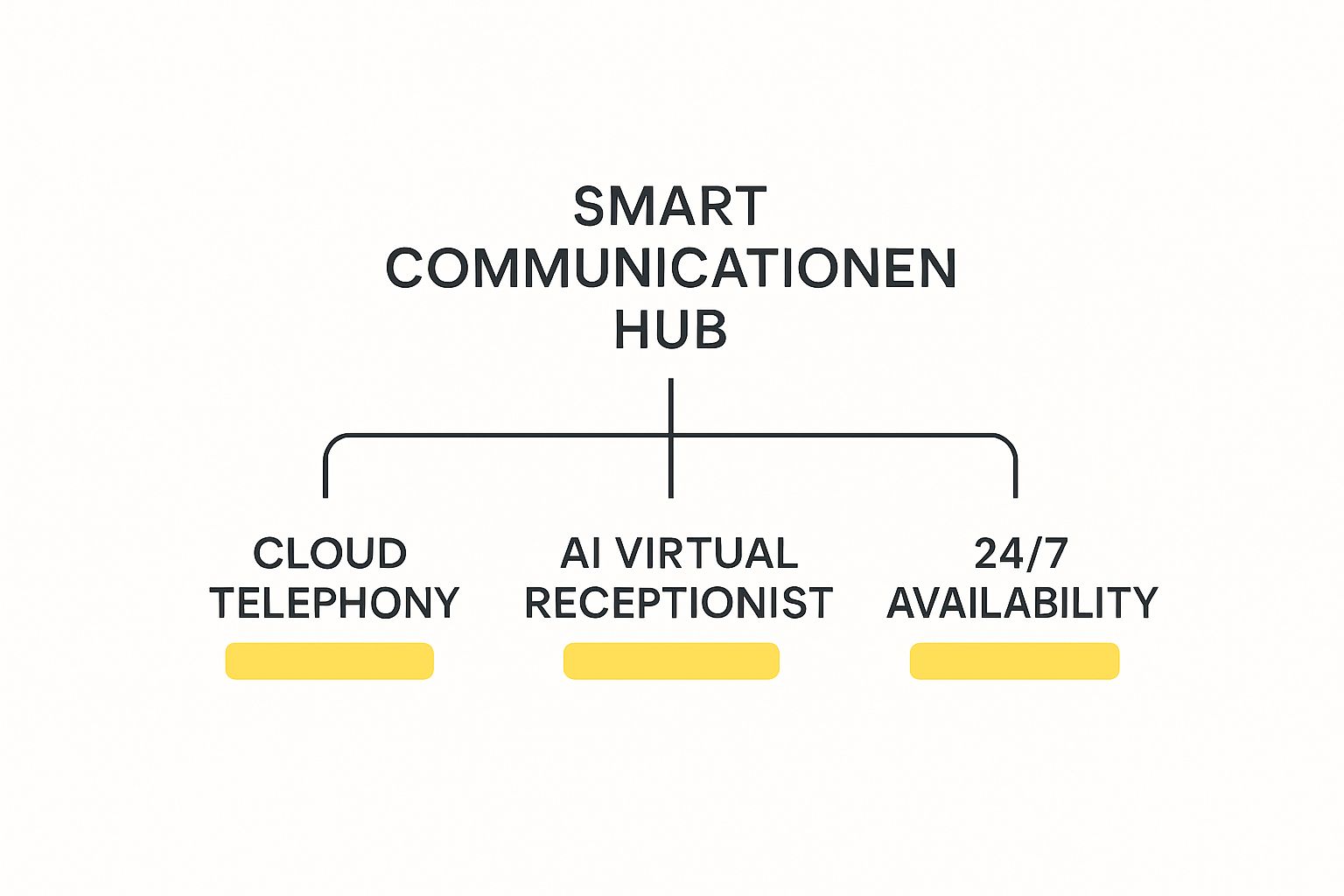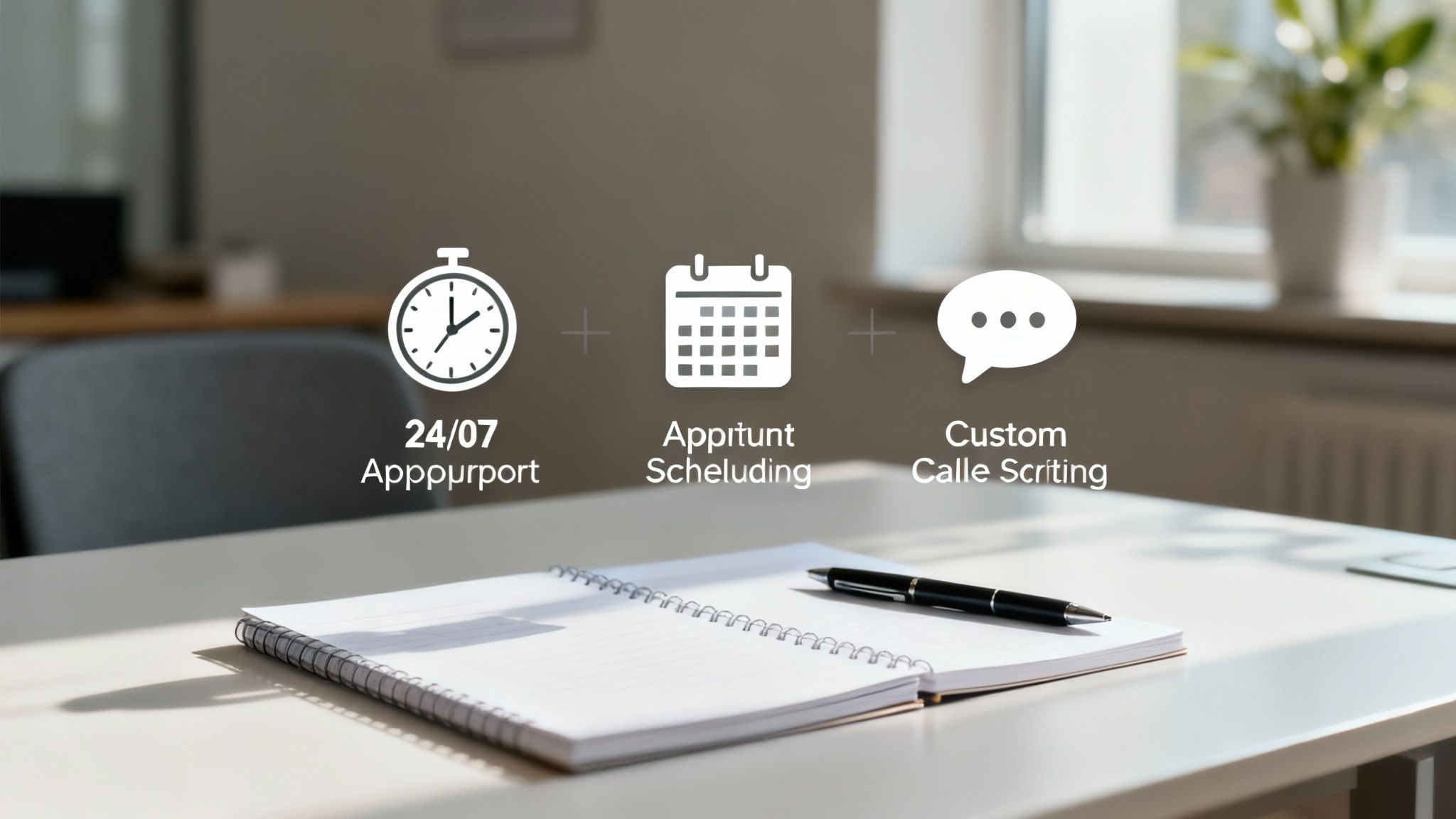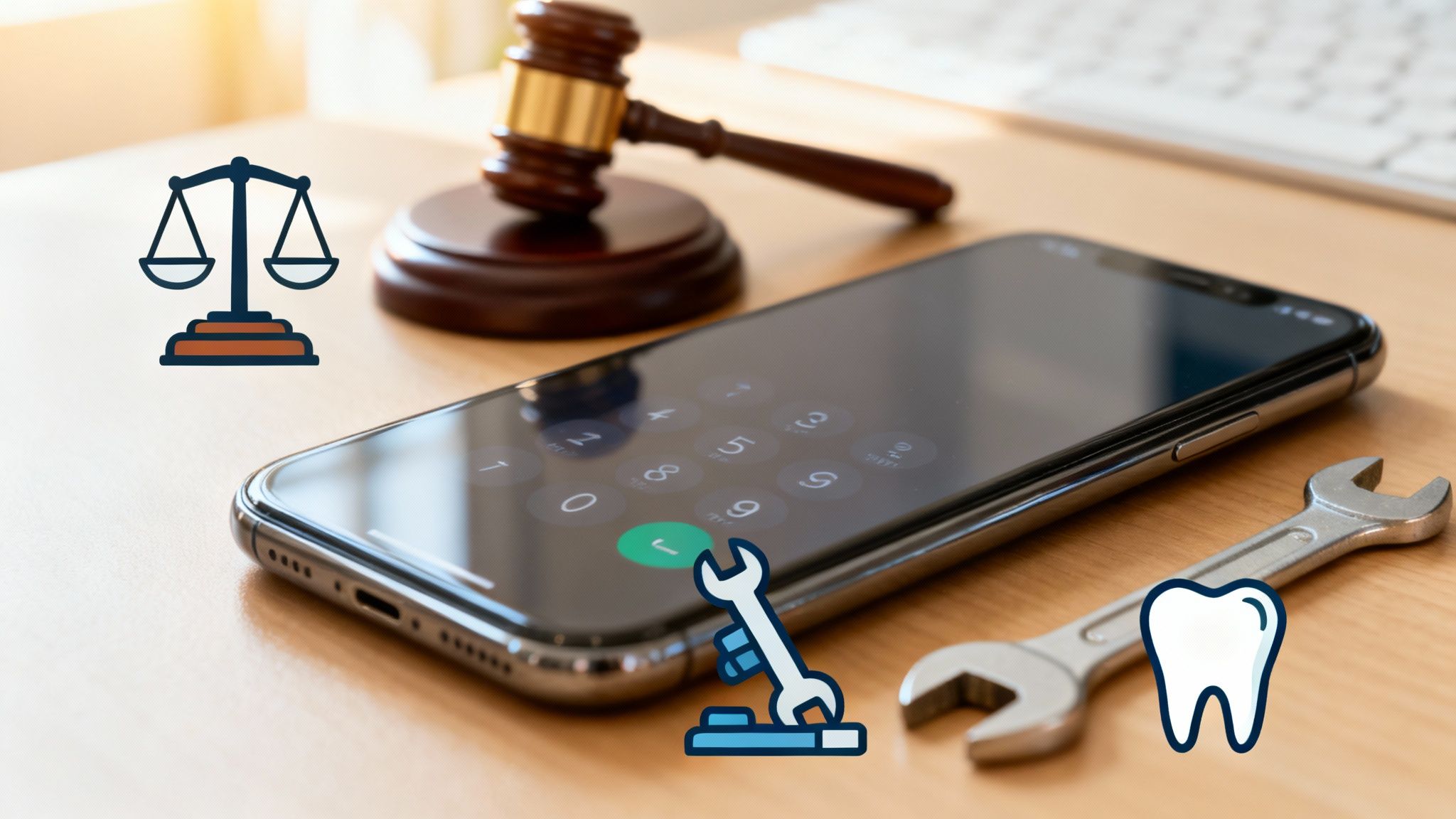Picture this: you're a plumber with your head under a sink, or a lawyer deep in concentration during a court hearing. Your phone buzzes—it's a new potential client. But you can't possibly answer. That call rolls over to voicemail, and by the time you're free to call back, they've already moved on to your competitor who picked up on the first ring.
It's a frustratingly common scenario, and the numbers back it up. A staggering 62% of potential clients will go with the first business that actually responds to them. Every single missed call isn't just a missed call; it's a genuine business risk.
A call answering service is the simple, powerful solution to this problem. It acts as a seamless extension of your team, making sure you never miss that crucial first contact.
So, What Exactly Is a Call Answering Service?

Forget thinking of it as just a fancy voicemail. A call answering service is an active, professional partner for your business.
It's Like Having a Five-Star Concierge on Deck
Think about a great hotel concierge or a top-notch receptionist. Their job isn't just to sit there. They greet people warmly, provide helpful information, take clear messages, and make sure everyone gets directed to the right person or department.
A call answering service does precisely that, just remotely. Whether it's a highly trained human agent or a clever AI system, the goal is the same: ensure every single person who calls your business is greeted professionally and has their needs met straight away.
This simple act immediately builds a brilliant first impression. It tells callers your business is organised, on the ball, and genuinely values their time. That's how you build trust right from the get-go.
It’s a World Away From a Simple Voicemail
The difference between a standard voicemail and an answering service is night and day. A voicemail is a passive, one-way dead end. It dumps the entire responsibility of following up back onto your already-full plate.
An answering service, on the other hand, is a dynamic, two-way conversation.
Here's what sets them apart:
- Real, Immediate Engagement: Callers get to speak to a real person or an intelligent system that can actually help them, not just a recorded greeting.
- It Gets Things Done: The service can actively book appointments for you, qualify new leads so you only deal with the serious ones, or patch urgent calls straight through to your mobile.
- You're Always on Brand: With custom scripts, the service sounds exactly like your business. It's your company’s unique voice and professional standards, every single time.
A call answering service transforms a missed call from a lost opportunity into a captured lead, a booked job, or a happy customer. It’s not just an admin tool; it’s a strategic engine for business growth.
The Shift from Voicemail to Smart Communication
Remember the blinking red light on your old desk phone? That used to be the signal for a new message, but these days, it’s more often a sign of a missed opportunity. Voicemail just doesn't cut it anymore. Today's customers want answers now, and thankfully, technology has caught up, turning basic message-taking into a seriously smart way to communicate.
This whole shift is driven by two big players: cloud telephony and artificial intelligence. Cloud telephony is what cuts the cord, freeing your business phone from a physical location. It's the magic that lets a call answering service work from anywhere but still sound like they’re right there in your office. It’s the foundation for all the cool stuff that comes next.
Then you've got AI-powered virtual receptionists layered on top. And no, I'm not talking about those clunky, robotic automated menus that make you want to throw your phone at the wall. Modern AI actually understands what people are asking, can book appointments on the fly, and dish out helpful info 24/7. It means your business is basically always open.
Making Professional Service Accessible
Not too long ago, the only way to make sure every call got a professional answer was to hire a full-time receptionist. For most small and medium businesses in Australia, that’s a massive financial hurdle.
But artificial intelligence is changing the game entirely. A traditional receptionist in a major Aussie city can set you back over AUD $55,000 a year—a hefty chunk of your overheads. An AI-boosted virtual answering service, on the other hand, can provide that same round-the-clock cover for a fraction of the cost, usually somewhere between AUD $200 and $600 a month.
This infographic breaks down how it all comes together to create a modern communication setup.

As you can see, it’s about using cloud systems and AI to be constantly available, moving miles beyond what an old-school phone system could ever do.
This new approach puts a professional front desk within reach of everyone, from a solo tradie to a growing legal practice. It completely levels the playing field, letting smaller outfits offer the same slick, instant service as their biggest competitors. For a real-world example, check out the benefits and workings of AI leasing assistants to see how it’s shaking up the property management industry.
This shift means that a robust call answering service is no longer a luxury. It has become an accessible, strategic tool for capturing leads, improving customer satisfaction, and driving growth without breaking the bank.
Modern systems also come packed with features that make old-fashioned voicemail look ancient. For instance, smart services can transcribe your messages into text, so you can read them at a glance instead of listening to them one by one. Our guide on how a voicemail to text service works explains how this feature alone can save you hours every week. It’s all part of a smarter communication stack designed to ensure you never miss another important message or a golden opportunity.
Key Features Your Business Needs

A modern call answering service is a whole lot more than just a fancy message pad. Think of it as a powerful toolkit built to solve real-world business problems, whether that’s capturing leads after hours or getting your entire week organised.
Once you understand the key features, you start to see just how much these services can change the game for your day-to-day operations.
The absolute cornerstone is 24/7 live answering. It’s the core promise: no matter when a customer calls—midnight, a public holiday, you name it—a professional, human voice is there to represent your business. This constant availability is massive for building trust and making sure you never miss an urgent opportunity.
Beyond Basic Message Taking
Sure, taking a clear, accurate message is crucial, but today's advanced services offer tools that actively manage your workflow. These features transform a passive service into an active business partner, handling tasks that would otherwise fall on your plate or your staff's.
Here are a few game-changing operational features:
- Appointment Scheduling: Instead of just jotting down a request, the service can tap into your calendar and book appointments directly. A busy dental clinic can fill its schedule overnight, or a consultant can wake up to a fully booked day without lifting a finger.
- Lead Qualification: Let's be honest, not every caller is a ready-to-buy customer. A good service uses a custom script to ask the right questions, separating the hot leads from the general enquiries. This means your sales team only spends time on the most promising prospects.
- Custom Call Scripting: This is how you ensure every call is handled exactly as you would. You provide the script, FAQs, and tone of voice, so the virtual receptionist sounds like a perfectly trained member of your own team, keeping your brand’s personality intact.
Think of these features as building blocks for efficiency. By offloading these routine but critical tasks, you free up immense amounts of time to focus on core business activities that actually drive revenue and growth.
Smart Routing and Integration
The real magic of a modern call answering service is how it connects calls and information to the right places within your business. It acts like a smart switchboard, directing traffic exactly where it needs to go, instantly and accurately.
Intelligent call routing, for example, is a game-changer. It uses pre-set rules to figure out a call's urgency and where it should go. A call from a major client might be patched directly through to your mobile, while a supplier enquiry is sent to your email as a message. You can learn more about how intelligent call routing works to streamline business communication.
Finally, seamless CRM integration is essential. When a service logs call details straight into your customer relationship management software, it creates a unified record of every single interaction. This gives you a complete picture of your customer journey and makes sure your follow-up is always informed and personal, turning simple phone calls into valuable business intelligence.
How Different Industries Win with Answering Services

A call answering service isn't a one-size-fits-all product. Its real value is how it clicks into place to solve the unique headaches of different industries. For some, it’s about looking polished and professional. For others, it’s all about grabbing every single lead in a market that moves at lightning speed.
But the core idea is always the same: solving specific, industry-based communication problems.
Think about a solo lawyer in Melbourne. Their real skill is in the courtroom, not playing receptionist. With a specialised answering service, they can screen new client enquiries, get consultations booked in, and make sure every call is handled with the kind of confidentiality the legal field demands.
Suddenly, they project the image of a much bigger, fully-staffed firm. And it’s not just for show. With 62% of potential clients picking the first firm that gets back to them, being available instantly isn't a luxury—it's how you win in a crowded market.
Trades and Field Services
For tradies—plumbers, sparkies, HVAC techs—the office is usually the front seat of the ute. When you’re up a ladder or under a sink, answering the phone isn't just tricky, it can be downright dangerous. And a missed call? That’s almost always a missed job, because the caller just rings the next name on the list.
A call answering service becomes their mobile command centre. It can:
- Capture urgent job details from a customer with a burst pipe.
- Schedule non-urgent quotes for the following week.
- Give customers a clear idea of when to expect a callback.
This means while the tradie is focused on the tools, their pipeline of future work is quietly filling up in the background. It turns a chaotic flood of calls into a neat, organised workflow.
A tailored answering service gets the lingo of your industry. It knows the difference between a "drop-everything" emergency and a routine enquiry, making sure the right information gets to you at the right time.
Real Estate and Property Management
The property market doesn't clock off at 5 pm. Enquiries from buyers, sellers, and tenants can roll in at all hours. A real estate agent can’t be on call 24/7, but their business needs to be. Missing a call from a red-hot buyer could mean watching a hefty commission walk out the door.
Answering services built for real estate can juggle everything from booking property viewings to logging late-night maintenance requests from tenants. This kind of backup is crucial for keeping service levels high and staying responsive.
You can check out our full guide on how a real estate answering service gives agents the power to manage their communications without being glued to their phones. This dedicated support helps them focus on what they do best—closing deals—while ensuring no opportunity ever slips through the cracks.
Getting Your Answering Service Hooked into Your Workflow
Bringing a call answering service on board isn't just about handing over your phone line. It’s about weaving a seriously powerful communication tool right into the fabric of your business. When you get it right, it stops feeling like a separate add-on and starts acting like a true extension of your team, feeding valuable info back into your daily grind.
The magic word here is integration. A standalone service that just takes messages? That’s handy, sure. But a service that plugs straight into the software you already use? That becomes an active player in your business's growth.
Turning Phone Calls into Actionable Data
Think of your answering service as a data collection point. Every single call is packed with important information about a customer—their needs, their history, or their potential value. The goal is to get that data flowing automatically into the systems you rely on every day.
By connecting your service to your Customer Relationship Management (CRM) software, for example, every new lead, appointment, or customer question gets logged instantly against the right client file. Just like that, you’ve got a complete, unified history of every interaction. Your sales team can see the full picture before they even think about picking up the phone to follow up.
This seamless flow of information gets rid of double-handling data and makes sure no lead ever gets lost on a sticky note or in a forgotten email. It turns your answering service from a simple message-taker into a central hub for business intelligence.
Creating a Smooth Onboarding Process
If you want your virtual receptionists to sound like they're part of your crew, you need to train them like they're part of your crew. A detailed, thoughtful onboarding process is the key to making the service a genuine reflection of your brand.
This is about more than just a welcome email. It’s a strategic move to arm your new remote team with everything they need to absolutely nail it.
Here’s what a solid onboarding process should cover:
- Crafting Effective Call Scripts: Work on scripts that capture your brand's unique voice and tone. These aren't meant to make them sound like robots. Instead, they should guide the conversation, ensuring all the key info is gathered and common questions are answered correctly, every single time.
- Providing Company Protocols: Give your service crystal-clear instructions on how to handle different situations. Define what counts as a genuine emergency that needs an immediate patch-through versus a routine query that can be bundled into an email summary.
- Training on Your Business: Give them a quick rundown of what your business actually does, who your typical customers are, and what sets you apart from the competition. This bit of context helps them handle calls with a lot more confidence and understanding.
Missed calls often mean missed revenue, as plenty of callers who hit voicemail will just hang up and ring a competitor. To get around this, businesses in cities like Melbourne are increasingly adopting answering services that plug directly into their sales tools. This gives them full visibility into every customer interaction and lets them follow up quickly and effectively. You can discover more insights about how Melbourne businesses are capturing leads with answering services. Taking these steps ensures your service operates not just for you, but as you.
Choosing the Right Service for Your Business
Picking the right call answering service can feel like a massive task, but if you break it down into a few key areas, the decision gets a whole lot clearer. The goal is to find a partner that lines up with your budget, how you operate, and where you want your business to go.
First things first, look at the heart of any service: its reliability and professionalism. You’re handing over one of your most valuable assets—your customer conversations. It’s absolutely essential to pick a provider with a solid track record for being dependable and delivering top-notch customer care.
A great way to figure this out is to ask them directly about their agent training, how they check for quality, and what experience they have in your industry. A service that gets the little details of legal intake or understands the panic of a plumbing emergency will be leagues better than a generic operator.
Evaluating Pricing and Scalability
Pricing models can be all over the shop, so it's important to get a handle on what you're actually paying for. Some providers charge by the call or even by the minute, while others offer monthly plans with a certain number of calls included.
- Per-Call/Per-Minute: This can be a great shout if your call volume is low or all over the place. You only pay for what you use.
- Monthly Plans: These give you cost certainty, which makes budgeting much easier. They’re perfect for businesses that have a steady flow of incoming calls.
But don't just look at the initial cost. Think about how the service can grow with you. Ask potential providers about their scalability. Can you easily bump up your plan during a busy season or as your business expands? A flexible service stops you from getting stuck in a plan that no longer makes sense for you.
Key Questions to Ask Potential Providers
Before you sign on the dotted line, get a checklist of essential questions ready. This will help you compare different services properly and sniff out any potential red flags.
Don't just get dazzled by features; dig into the operational nitty-gritty that will affect your day-to-day. A smooth partnership relies on clear communication and shared expectations right from the start.
Here are some crucial questions to get you started:
- What’s your average call answer time?
- Have you worked with businesses in my industry before?
- What kind of reporting and analytics can I expect?
- How do you handle data security and client confidentiality?
- What does your onboarding process involve?
This personalised approach is especially effective for Australian businesses. For many small and medium enterprises, getting started with a quality call answering service can cost as little as AUD $30-$50 per month, making it a seriously accessible investment. Many services also offer integrated reporting and customer management tools that let you track performance, which is a vital metric in today’s competitive market. You can find more insights on call answering costs and benefits in Australia on virtualreception.com.au.
Got Questions? We've Got Answers
How Is a Call Answering Service Different from a Call Centre?
It's a common point of confusion, but they're really two different beasts. Think of a call answering service as your dedicated, off-site receptionist. They get to know your business, handle calls just like an in-house team member would, and focus on personalised tasks like taking messages or booking appointments.
A call centre, on the other hand, is built for scale. They're the big guns, designed to manage massive volumes of calls, usually for large companies needing complex customer support or technical help. It's less about that personal touch and more about pure volume and efficiency.
Can It Sound Like My Own Staff?
Absolutely, and that's the whole point. A good service works closely with you to nail down your business's specific tone, language, and processes. They'll use custom scripts you've approved to make sure every caller has a seamless experience.
The goal is for your customers to hang up thinking they just spoke with someone sitting in your office, not a third-party service. It’s all about maintaining that brand consistency and trust.
Is It Affordable for a Small Business?
Definitely. You don’t need a massive budget to get professional call handling. Many services are built with small businesses and startups in mind, offering flexible plans that can scale as you grow.
You can often get started for a surprisingly low monthly fee. It’s one of the most cost-effective ways to project a big-business image and make sure you never miss a lead, all without the overhead of hiring a full-time receptionist.
Stop missing important calls and start managing your communications efficiently. OnSilent gives you back your time by intelligently filtering spam and organising your messages. See how it works at https://onsilent.com.

